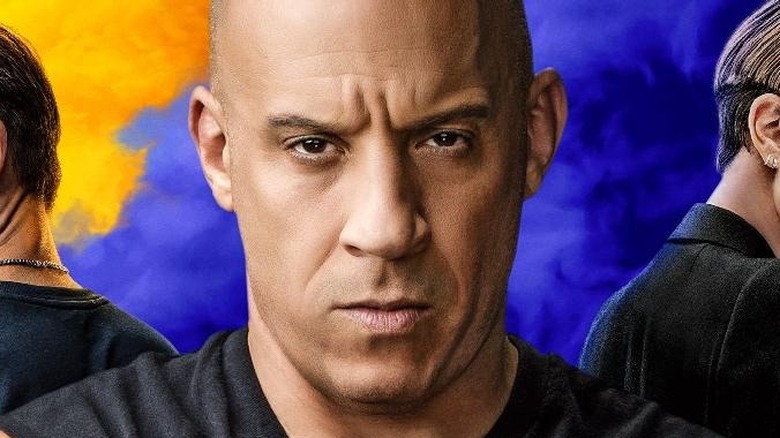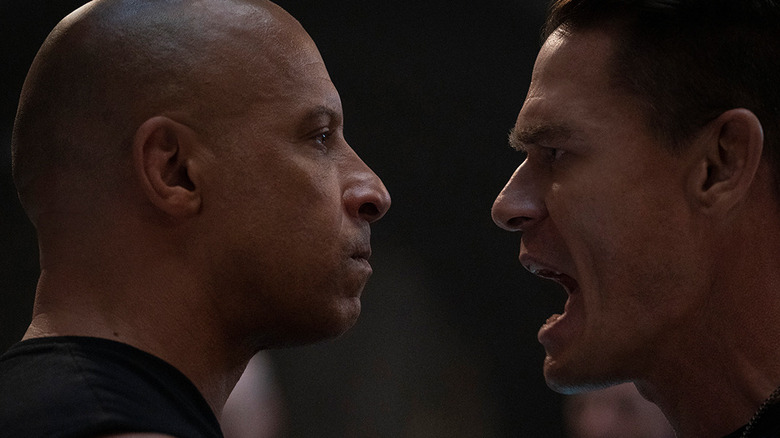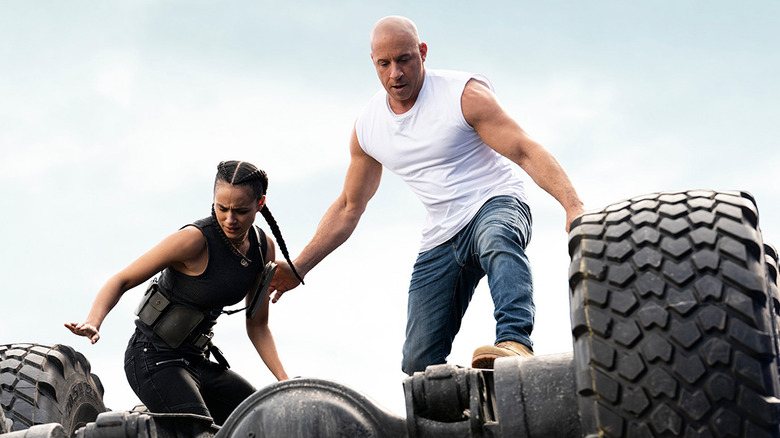F9 Review: Heaven Or NOS Vegas?
At this point, it's a cliche to marvel at the curious tenure the "Fast & Furious" franchise has garnered over the last two decades. From a "Point Break" pastiche that swapped surfboards for modded street cars to a cinematic universe that somehow splits the difference between the James Bond films and the MCU, Dominic Toretto (Vin Diesel) and the "Fast" famiglia have been through quite a lot. But with the COVID-delayed "F9" finally hitting the multiplex, the question on the lips of diehard fans and casuals alike remains the same. How many more of these can they reasonably make? Once you take some renaissance man gearheads from Echo Park into outer orbit (as this release does), where's left to drive? Time travel?
Director Justin Lin, the man who joined the series in "Tokyo Drift" and took it to its highest heights with "Fast Five," is back in the driver's seat, and his return couldn't come at a more opportune time. Whether the alleged two-parter tenth film can truly stick the landing as a meaningful conclusion to such a long and convoluted saga remains to be seen. But as a welcome return to form after two outings that were more successful financially than they were critically, "F9" delivers, even if the complicated baggage the property keeps in the trunk continues to dually function as a gift and a curse.
Sure, the plot mechanics remain dodgy at best and the overall tenor of a bunch of drag racers evolving into literal globetrotting superheroes may prove too off-putting for some (even if many of those same detractors suspend their disbelief for a lot less.) But "F9" works for the same reason the best films in the series have worked. Beneath all the utter insanity, this is one of the only reliable studio offerings that wears its heart on its sleeve.
They wink here and there and the films aren't above poking a healthy bit of fun at their absurdity, but deep down, these are sincere stories about family, obligation and duty. There is a meat-headed poetry at play that no other modern pop art can even begin to replicate.
Also, in this one, they have cars equipped with ultra-powerful magnets that fling other cars around on the road like barrels in "Donkey Kong," so what else could you conceivably want?
A tale of two Torettos
When initial trailers revealed the central villain for this new outing in the "Fast" universe would be Dom's secret, evil younger brother Jakob and that it would be WWE superstar turned thespian John Cena bringing the rogue to life, it felt both laughable and apropos. It's hard to imagine Cena and Diesel sharing a mother, a father, or really any notable genetic tether. But at the same time, who else possesses the correct mix of lunkhead bravado and earnest, if limited, emotive power? As comic book-y and soap operatic a narrative development this new wrinkle may be, Lin and co-writer Daniel Casey treat the core conflict at the heart of "F9" with the gravitas of a "Godfather" sequel.
The movie begins in 1989, with a flashback to the tragic death of Dom's father Jack Toretto (J.D. Pardo), a milestone event in "Fast" mythology heretofore only spoken of in 2001's "The Fast & The Furious." This formative moment in time is presented with a patience and a sense of care that helps to ground "F9" from the somewhat unwieldy nature of F. Gary Gray's "The Fate of the Furious," re-injecting a necessary dose of pathos to the proceedings.
On one hand, props must be given to Diesel for lacking the hubris Kevin Costner was plagued by when the then-39-year-old actor played the lead in 1994's "Wyatt Earp" at age 17 for the film's early scenes. But Vinnie Bennett, the newcomer who plays young Dom, more closely resembles street magician David Blaine than our favorite gravel-voiced barbecue dad. These flashbacks, luckily, never overstay their welcome and are doled out throughout the present-day plot, providing tragic complication after tragic complication in the thorny relationship between Dom and his baby brother who betrayed the family so profoundly, he had his last name stripped and could never step foot in Los Angeles again.
The backbone of a movie whose plot is otherwise laughable in detail — something about a world-ending MacGuffin that requires a satellite to function, for literally no reason other than to tick the "going into space" box off everyone's "Fast" bingo card — happens to meld the street-level intimacy of Martin Scorsese's "Mean Streets" to the pugilistic poetry of Sly Stallone, a heartfelt little crime tale of brotherhood chopped up amid the cacophony of vehicular carnage and extremely expensive stunt work. Only instead of Harvey Keitel and Robert De Niro, it's Diesel and Cena, and instead of Lee Strasberg's Acting Studio, the tenor of the performances skews more Monday Night Raw.
If this series has taught its loyalists anything, it's that most villains are just misunderstood heroes waiting for their shot at redemption and to be given the honorific of "family" by Toretto, not unlike the exponentially expanding cast of heroes in something like "Dragonball Z." So from the moment we meet Cena's Jakob, with his murky, Machiavellian designs on world domination, it's a matter of when, not if, he will heal old wounds and toast a Corona at the cookout with the core cast.
In that vein, "F9" delivers all the "dudes rock" feels necessary to make a movie about people saving the world in supercars seem biblical in nature. For every monosyllabic expression of generational trauma from its leads, there is an equal and opposite expulsion of violence and material destruction to make that internalized anguish into a worthwhile, cathartic spectacle.
And if that was all "F9" was, it would stand shoulder to shoulder with the series' previously unmatched heights. It would be reassuring proof that this franchise can in fact never truly die, so long as there's new musclebound movie stars for Diesel to tussle with before ultimately forgiving and passing a medium-rare steak.
But "F9" is not without its problems.
Was eight enough?
The thing about the "Fast" films is that the franchise's meager beginnings have, over time, aged like wine into an organic mythos. Silly, unimportant elements from the earlier releases have grown into powerful totems, imbued with emotional heft never initially conceived of by the filmmakers. Giant canisters of NOS, cold Coronas, keys to ten-second cars — they all have the same weight as any meaningful arcana from a fantasy novel. Its sprawling cast, picking up strays with every continuing installment, means there's always room for fun new cameos, like a brief appearance in "F9" from Cardi B, or callbacks to prior bit players, like the scene of Helen Mirren Tokyo drifting in high heels everyone loves from the trailer.
But as the series has expanded, its narrative machinations have become more complex. Not in the sense that they're more ornately arranged or carefully orchestrated. They're just more dense. There has to be space made for Tyrese to get his unfunny jokes off. In prior movies, there needed to be room for the Rock to do ... the Rock things. The action itself, the big show-stopping set pieces, need room to breathe and play out. Since nobody wants a three-hour-plus "Fast" film and the studio has too diverse an array of filmgoers to keep happy, the result, even in this otherwise strong and entertaining outing, is a messy smorgasbord of a film. One whose tonal balance is better calibrated than the last couple of chapters, but still misaligned.
Because it isn't just about Dom and Jakob and having to save the world. It's about the return of Han (Sung Kang), the series' beloved character whose death and subsequent face-turn for his murderer (Jason Statham's Shaw) caused an uproar among fans. It's also about finding space for his "Tokyo Drift" cohorts like Lucas Black and Bow Wow. It's about catching up with the last film's villain, Cipher (Charlize Theron), the woman who killed the mother of Dom's son, Brian. And speaking of the child's namesake, it's also about finding ways for Brian's wife — and Dom's sister — Mia (Jordana Brewster) to exist onscreen in a way that doesn't call uncomfortable attention to the fact that Paul Walker is no longer with us.
It's a difficult math problem and a trapeze act that Lin and company only intermittently pull off. For every brilliant set piece showcasing the brand of action that keeps these films thrilling, there's a less articulate exposition dump waiting on the other side to be punctuated by Tyrese's sorry excuse for comic relief. Hell, Brewster and Michelle Rodriguez had to complain about never having dialogue with one another after nine movies and finally get a little Bechdel Test-passing screentime, only for it to feel stilted, awkward and shoehorned in. That's saying something for a franchise for whom "shoehorned in" has become the status quo.
Before "F9," this truly felt like a franchise that could prosper indefinitely, like a muscle car whose guts could be switched out by necessity, but with the right amount of care and repair, still drive forever. But as fun and welcome as this newest film manages to be, it's unfortunate proof that the end of the road is in sight. It's time for everyone involved to focus on the right time to trigger that NOS to get past the finish line. No more laps. Let's end it on a high note.


